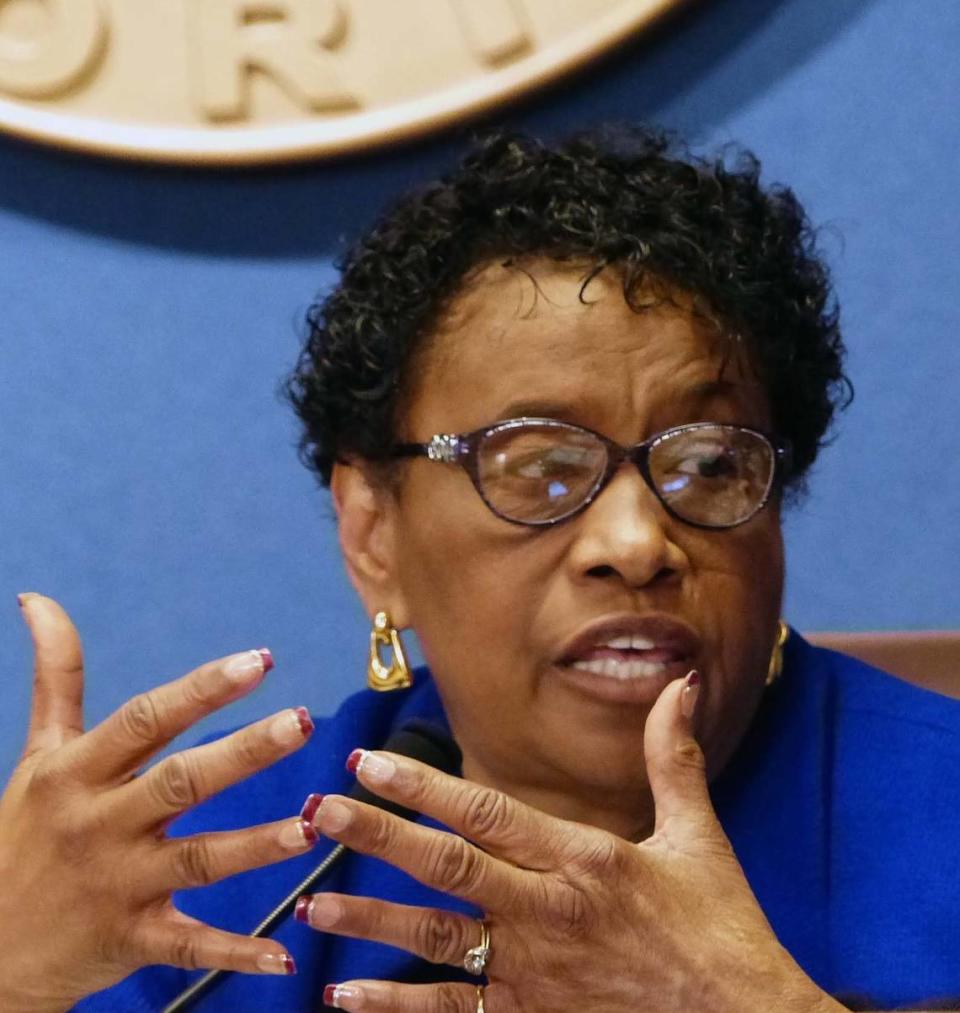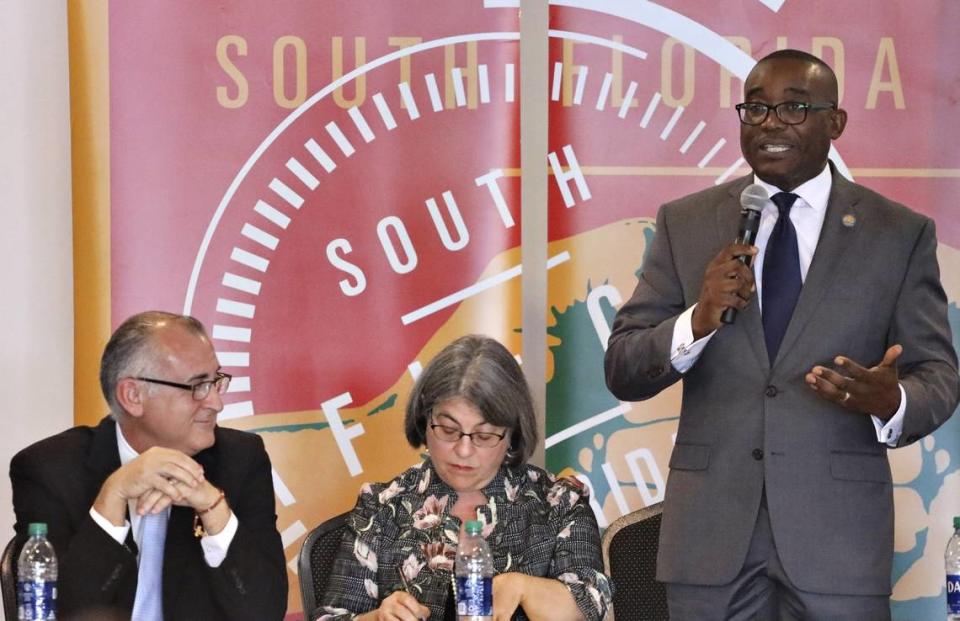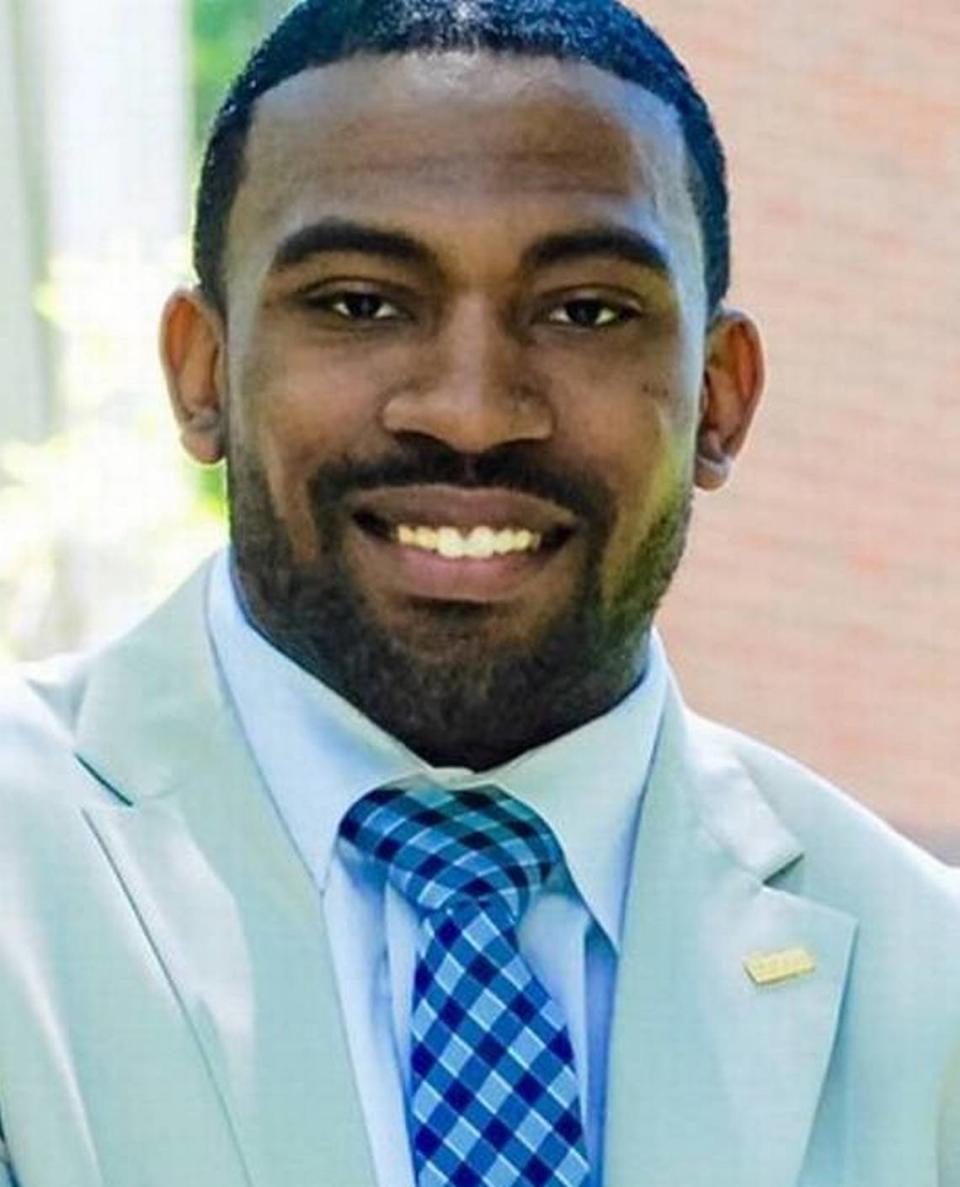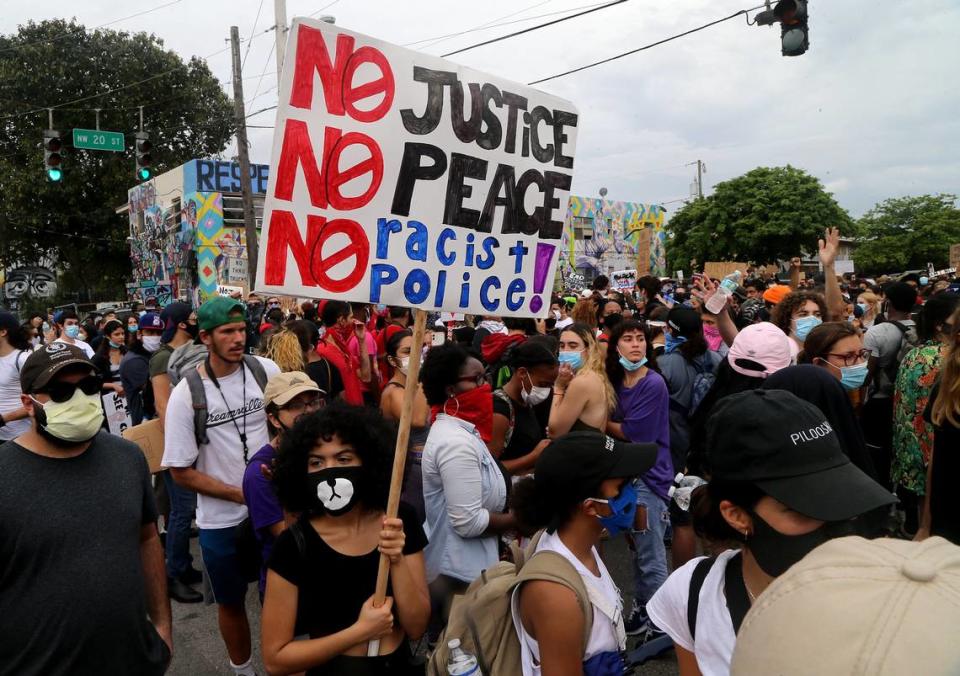Calls for civilian oversight of police grow louder amid protests in Miami
Four decades after Miami’s black community erupted in anger after four white Miami-Dade County police officers were acquitted of killing black insurance salesman Arthur McDuffie, the county is again grappling with the idea of civilians overseeing the actions of its police force.
The calls for an independent review board have grown louder as massive protests have unfolded in South Florida and almost every other major U.S. city, since George Floyd, an unarmed black man, died after a white Minneapolis police officer held his knee on Floyd’s neck.
Demonstrators are demanding more police accountability. On Wednesday, the county’s Black Affairs Advisory Board formally urged Miami-Dade to install a citizen review board. In the meantime, the board resolved to act as its own review panel through public records requests of citizen complaints.
“The time is now,” said Justin Pinn, a black educator and leader of a federally appointed board overseeing reforms in Miami’s city police department. “The time is really yesterday.”
Critics such as police unions, which deliver votes and campaign contributions, argue civilian oversight is just another unnecessary, unchecked layer of review on top of internal affairs — an arm of the police department that reviews its own.
“When you add this, who regulates them?,” said Steadman Stahl, president of the union called the South Florida Police Benevolent Association. “They want to be totally independent. They answer to nobody. I think that’s kind of dangerous.”
Proponents have long maintained that cops policing each other allows officers to protect each other, and that outside eyes provide better scrutiny.
Panels like one that existed for 30 years after the 1980 McDuffie riots can investigate complaints against police and independently review internal affairs inquiries. Such groups have no authority to discipline officers — but they can seek answers, review records and issue reports and recommendations to top police brass, who have no obligation to follow the advice.
The county panel lost its funding in 2009 during a budget crisis, and the money never returned, despite high-profile incidents of police misconduct in Miami-Dade.
In 2018, Mayor Carlos Gimenez vetoed legislation backed by the County Commission’s four black members and passed by a slim majority of commissioners to reinstate the board, with seats filled by representatives of community groups. Gimenez said he would only accept a board appointed solely by county commissioners.
Last week, as thousands took their frustration to Miami’s streets, a Miami-Dade commissioner running for mayor in August said one of the reasons the county doesn’t need to revive the oversight panel is because the commission is diverse enough — even though commissioners have no part in investigating complaints against police.
Other law enforcement agencies handle complaints against their officers differently.
In Broward, County Mayor Dale Holness said he favors creating such an oversight group. Sheriff Gregory Tony would prefer to give a recently overhauled joint police/citizen review board a chance to hold deputies accountable before advocating for an independent panel.
In Miami, the debate is underscored by a history of affronts to the African-American community, from the construction of Interstate 95 through the heart of Overtown in the 1960s, to the McDuffie verdict in 1980, to the killing of several unarmed black men by police in the early 2010s. Those killings led to investigations and monitoring by the U.S. Department of Justice.
More recent incidents have raised questions about officers’ use of force, and in January, black members of the police department said leadership has ignored complaints of discrimination within the force.
Police oversight is certain to emerge as a key issue in this year’s elections. An exasperated black community wants leaders to follow through on meaningful change.
Who watches the police?
In 1979, 33-year-old McDuffie ran a red light on his motorcycle. When Miami-Dade County officers caught up to the former Marine, they beat him into a coma. He died days later from his injuries. In 1980, an all-white Tampa jury acquitted four Miami-Dade officers of killing McDuffie.
Riots broke out in Miami. Buildings were set aflame and the National Guard was deployed. Eighteen people were killed, hundreds were hurt and a community was scarred by the pain of feeling that justice was not served.
In the aftermath, Miami-Dade County created the Independent Review Panel to hear and investigate complaints of police misconduct, review disciplinary actions by internal affairs, and issue reports and recommendations. The panel worked for 30 years until it lost its funding in 2009 during the budget crisis caused by the Great Recession.
In 2018, Gimenez vetoed a revival of the review panel after Miami-Dade commissioners approved the measure. The vote was led by one of the commission’s four black members, Barbara Jordan. A group of citizens studied the history of the original panel for a year, ultimately recommending it be revived as the “Independent Community Panel,” which would hear complaints against police officers and other county employees.

Commissioners brushed back objections from the county police department and law enforcement union, with Yes votes from each of the 13-seat commission’s four black members — Jordan, Audrey Edmonson, Jean Monestime and Dennis Moss — and three other commissioners.
At the time, commissioner and former Miami-Dade police officer Joe Martinez argued against scrutiny of police by civilians.
“I suffered under these people,” Martinez said. “I don’t like being judged by people who have never walked in my shoes.”
When he issued his veto, Gimenez said he would only support a board filled with commissioners’ political appointees. Jordan’s proposal would have filled seats with representatives of outside groups, including the county’s police chief association and the American Civil Liberties Union.
On Thursday, Gimenez reiterated his position, saying he wanted a politically appointed board and not one with seats filled by outside groups.
“I wanted the commissioners to be able to name their own representatives,” he said.
This week, Miami-Dade Commissioner and mayoral candidate Esteban “Steve” Bovo said the county has enough accountability measures in place for police.
“For the record, in Miami-Dade we have numerous community relations boards, a County Commission that is one of the most diverse in the nation, as well as training requirements for our law enforcement that has evolved over years of difficult situations,” said Bovo.

Bovo tweeted the statement Sunday after CBS4 reporter Jim DeFede asked several county mayor candidates if they would support reestablishing a civilian review board.
In 2018, Bovo voted against the panel’s revival. Two other sitting commissioners and mayoral candidates, Daniella Levine Cava and Xavier Suarez, voted for Jordan’s legislation and said this week they still want to see the board reinstated. Alex Penelas, the former mayor who is running again in 2020, said he is also supportive.
“Citizen participation and oversight is always a good thing and goes a long way in restoring confidence,” he said. “That’s why I supported and funded an Independent Review Panel when I was mayor and support it now.”
Police civilian oversight panels have always been a controversial topic and despised by politically powerful police unions, which view them as just another unnecessary layer of authority in addition to internal affairs. The unions have fought particularly hard against oversight groups that are granted subpoena power, which the unions believe violates protections under Florida’s Law Enforcement Officers’ Bill of Rights.
In the city of Miami, spates of police violence and corruption led voters to override any such opposition in 2001.
The Civilian Investigative Panel (CIP) was overwhelmingly approved by referendum that year after multiple fatal police shootings of black men. Thirteen officers were indicted on charges of planting guns, nine of whom were later convicted. Support for the vote was cemented in 2000 after members of the Cuban-American community complained of rough treatment at the hands of police during the seizure of Elian Gonzalez.

Still, the union continued to battle the civilian panel and was finally rewarded in 2017 when the state’s Supreme Court ruled the panel could no longer subpoena city police being investigated because it violated protections of officers’ rights under state law.
The decision ended an eight-year battle with the union that began when one of the city’s most celebrated officers — Freddy D’Agostino, who once had a severed head tossed at him — filed a lawsuit to block a CIP subpoena in 2009.
After the first night of protests prompted by George Floyd’s death, Rodney Jacobs, the CIP’s assistant director, said the panel is a place for the community to air its frustration. He encouraged the community to take its complaints to the panel.
“Your only option is not just to protest or go to the streets. You can come to our office. You can file a complaint,” Jacobs said. “Use that collective energy that you have right now at our meetings. Use that collective energy to ensure that your local leaders understand why our department is vital. Use that energy appropriately.”
Miami panel has uncovered problems
Cases arising from the Miami panel’s work are sometimes covered in the media, but get little public attention. Its meetings are sparsely attended. The full panel meets the third Tuesday of every month. Meetings are being held online now during the pandemic. People can file complaints online.
The panel’s primary power is in the information it puts before the public by investigating claims, examining body camera footage and other records, and conducting interviews to see if complaints against police are valid and if internal affairs investigations were properly handled.
Officers rarely respond to interview requests during CIP inquiries — they are not obligated to participate and cannot be subpoenaed — but the panel has found in multiple cases that camera footage and other evidence contradict official police accounts.
The effectiveness of police oversight can be difficult to measure when the panel can only bring information to light and make recommendations. But the panel’s executive director, Cristina Beamud, pointed to a few examples that uncovered problematic internal affairs investigations and forced the police chief to take action.
She noted a case in 2014 when an attorney shopping at the Publix in downtown Miami watched a Miami police officer use a Taser on a homeless man while trying to remove him from the store. The attorney complained to internal affairs, which eventually closed the case because it couldn’t find the homeless man. Records obtained by the panel showed the Taser was deployed several times, leading Miami Police Chief Manuel Orosa to reopen the case and reprimand the officer.
Then in 2017, Beamud said, then-Chief Rodolfo Llanes agreed to reopen a case involving a Guatemalan woman who complained that police refused to help her when she reported her purse was stolen at a downtown department store. Internal affairs had closed the case because police said she couldn’t provide a passport to verify her identity.
Miami’s CIP has also engineered some fairly high-profile cases.
In 2007, a panel inquiry forced Miami Police Chief John Timoney to go before Miami-Dade’s Commission on Ethics and Public Trust over a Lexus SUV he had received for free from a dealership in Kendall. He had never recorded it as a gift. Timoney eventually agreed to a week’s docked pay, a $500 fine and a written reprimand.
In January 2019 the panel found fault with several officers who were seen on video kicking and pummeling a man named Ravon Boyd in Overtown as he lay on the ground with his hands in the air. Officers had lied on their written reports of the incident. One officer eventually resigned as the department was preparing paperwork to fire him for covering his body-worn camera.
The CIP has called out the department multiple times when police misused the cameras and failed to turn them on. In the case of Boyd’s beating, body camera footage from the officer who resigned contradicted the paperwork.
Body camera footage, along with bystander cellphone footage, has aided police oversight on multiple occasions.
Miami’s current police Chief Jorge Colina said he supports the civilian oversight panel because it was created by a public vote. Assistant Miami Police Chief Cherise Gause, a black woman, said the CIP helps to build trust and legitimacy in the community.
“It lessens the amount of suspicion,” she said.
The public has a difficult time understanding how difficult it is to fire a police officer, Gause said. Miami, for instance, had an officer on its payroll who had been suspected for six years of being involved in a murder but was never charged. Another, who was fired by Colina, returned after it was determined his firing violated the collectively bargained agreement between police and the city.
The officer suspected of being involved in the murder was finally fire last summer on a technicality — when a state appeals court ruled the city could fire him for refusing to take a drug test.
The citizens panel “is good for oversight and it helps the community to understand our policies and procedures,” said Gause.
At minimum, the panel provides people a public forum through which they can air their grievances.
“Oversight isn’t a new innovation. It helps people have outlets for their anger,” Jacobs said.
The anger over racism in law enforcement has manifested in protests that have ranged from calm to violent across the U.S., though demonstrations have remained mostly peaceful in Miami this week. Still, black community leaders want the public to know that calmer protests do not mean there isn’t a strong movement for change.
As protests across Florida intensify, Miami emerges as peaceful outlier. Here’s why.
At a meeting of Miami-Dade’s Black Affairs Advisory Board on Wednesday, members tried to deflate the notion that limited damage from protests meant the Miami area had exempted itself from policing problems that need fixing. The board voted to urge Miami-Dade to bring back the civilian review panel.
“I’m certain that every black person on this Zoom has had a family member, or has personally themselves, experienced some sort of racial bias, or racial treatment, at the hands of the police, in this county or wherever they’re from originally,” Ruban Roberts, president of the Miami-Dade NAACP and a board member, said during the online meeting.
Roberts said such a review panel can bring misconduct to light, even if the board has no subpoena power.
“Every municipality in the county, including the county, should have a civilian oversight panel,” Roberts said.
The advisory board’s chairman, Stephen Hunter Johnson, said he backed Gimenez’s position of political appointees for the board as long as the county provides proper funding for investigators. “We’ve had nothing while we waited so long for perfection” for the board to come back into action, said Johnson, a Miami lawyer. “If you look at the County Commission, it’s a really diverse place. I’m proud of that.”
At the meeting, Johnson announced the Black Affairs board would start serving as a temporary review panel through records requests for all citizen complaints against county officers.
“We’ll start asking the questions,” he said.
The review panel was part of a collection of reforms promoted by advisory board members at Wednesday’s meeting. Others included weakening Florida’s officer bill of rights to allow quicker and more aggressive discipline of police misconduct, and establishing a countywide database of police complaints to prevent an officer from leaving his or her disciplinary record behind when hired by a nearby agency.
Last year, twenty-six other civic groups endorsed more civilian oversight in Miami-Dade, including the Community Justice Project, Family Action Network Movement, Temple Beth Sholom, Florida Immigrant Coalition and the Dream Defenders.

Violent history, federal oversight
When Justin Pinn talks about being a black man trying to address racism in policing, he talks about where he keeps his wallet when he’s driving. It’s out on the center console, visible, just in case he needs it to show a police officer who might respond with force if he were to reach into his pocket.
“If I get pulled over, I can say that I’m reaching for it,” he said.
Pinn, a local education nonprofit executive, described the everyday fears woven through the black experience of law enforcement, a perspective he brings to his role as chairman of a citizen advisory board created to oversee training and use-of-force reforms in the city’s police force since 2016.
The U.S. Department of Justice mandated the creation of the citizen board after a federal investigation sparked by a string of deadly police shootings. In eight months spanning 2010 and 2011, Miami police fatally shot seven young African-American men. In reviewing 33 police shootings from 2008 to 2011, the Justice Department found Miami police had excessively used deadly force and haphazardly investigated police shooting. A scathing 2013 DOJ report also stated that the department had used poor tactics that endangered officers and the public.
And the feds had come down on the department before. The DOJ said Miami’s problems were systemic issues that were unresolved by a previous and similar federal investigation.
2013 Justice Department report on Miami police by Joey Flechas on Scribd
With this context, Pinn reflected on the messages from those marching around Miami, the demands to overhaul the policing and the criminal justice system, from routine policing to the prosecution of abusive cops. Pinn and protesters asked for training that will help police identify and stamp out their own inherent biases.
“We’re going to need implicit bias training, or we will have a George Floyd in our community,” Pinn said. “If you’re not doing the work to prevent it, then it will happen.”
The board he leads has noted several positive changes the department has made after DOJ scrutiny. But the board has not been satisfied with the reports written by Jane Castor, who until recently was the federally appointed monitor tasked with overseeing the reforms.
A former Tampa police chief, Castor fell behind on delivering timely reports to Pinn’s board as she ran for mayor of Tampa in 2018 and 2019. The board never received evidence it requested from Castor to verify the department pursued implicit bias training and de-escalation techniques to avoid using excessive force.
After she was elected mayor of Tampa in May 2019, Castor and Miami police claimed the city was in compliance and the federal oversight was no longer necessary. The DOJ disagreed and appointed a new monitor. The consent decree that requires federal oversight was set to expire in March 2020, but the COVID-19 pandemic has prevented a formal resolution of the matter. A final report from the new monitor is still pending.
Pinn’s board has long discussed how the department would benefit from deeper cultural changes that would address issues with the public as well as internal problems.
In January, the city’s black police union accused Colina of ignoring complaints of racial discrimination and inequality in his force. In a public meeting at City Hall, the union outlined a list of cases that suggested a pattern of unfair treatment of black officers in the police department, particularly black men. Colina defended his record, pointing to promotions of black police through the ranks.
One of the association’s complaints focused on Javier Ortiz, a notorious Miami police captain and former union president who has risen through the ranks of the department despite making controversial and racist remarks and social media posts through his career. He once drew demonic eyes and teeth on a black suspect’s mugshot. He called 12-year-old Tamir Rice — shot and killed by Cleveland police while the child played with a toy gun — a thug. He publicly supported the Ferguson, Missouri officer who shot and killed unarmed Michael Brown.
At the January hearing, the black police union presented documents that show Ortiz identified as a white Hispanic when he first applied to work for the department more than a decade ago. Then years later, on exams taken to qualify for promotions, he listed his race as “black or African American (non-Hispanic).” Fellow police officers and commissioners were offended, and Ortiz incited more ire when he publicly asserted he was black.
“I”m a black male. Yes, I am, and I am not Hispanic,” Ortiz said. “I was born in this country. Never went to Cuba. I never went to Spain.”
Proposed changes in Broward
There isn’t an independent civilian oversight board for the Broward Sheriff’s Office, but Broward County Mayor Dale Holness told the Miami Herald on Monday that creating one “is an essential thing that needs to be done,” saying it would be a “very important step forward.”
Holness said there are problems with a department policing itself, including fear of retribution from colleagues if internal affairs officers recommend punishment against one of their own.
The mayor said he’s not sure whether the County Commission has the power to create such a panel, and that it may need to go through a voter referendum because the sheriff is independently elected. He said he plans to raise the question at a commission workshop on racial inequity planned for later this month.
Broward Sheriff Gregory Tony told the Herald he would support the idea, but wants to first give the office’s internal review panel a chance to start holding deputies more accountable for misconduct.
In February, Tony replaced 10 of 11 members of the Professional Standards Committee that makes recommendations to the sheriff’s office regarding deputy discipline, which includes both BSO command staff and civilians outside of law enforcement. The sheriff’s office also has an internal affairs division that turns its findings over to the panel for review.
Tony has fired several deputies since his January 2019 appointment, at times defying recommendations by the panel. That has contributed to an ugly relationship between Tony and the Broward police union, which has argued he exerts too much influence over the review process.
On Monday, Tony said he felt confident that the new members of the Professional Standards Committee, led by retired Broward County Judge Julio Gonzales, would make “more fair recommendations” than he feels the panel has in the past. But Tony added that he wouldn’t oppose considering a full civilian board if the existing committee failed the community.
“We would have to examine that,” Tony said. “If we can’t police ourselves effectively, then we’re gonna lose the public trust.”

